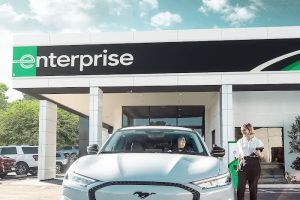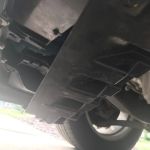
- 1. Understanding Car Rental Requirements
- 2. Choosing the Right Rental Car
- 3. Car Rental Insurance Options
- 4. Pick-Up and Drop-Off Tips
- 5. Knowing the Hidden Costs of Car Rentals
- 6. Tips for Driving in the US
- 7. Common Mistakes to Avoid
1. Understanding Car Rental Requirements
Renting a car in the United States for the first time can seem like a daunting task, especially if you're unfamiliar with the process. Before you book your car, it's essential to understand the basic rental requirements. Most car rental companies in the US will require you to be at least 21 years old, although some states may have a higher minimum age for renters. If you're under 25, you may also incur an additional "young driver fee."
In addition to age, you'll need a valid driver’s license and a credit card in your name. Some rental agencies may accept debit cards, but this can vary, so be sure to check the rental policy beforehand. International renters will also need an International Driver’s Permit (IDP) in addition to their home country driver’s license.

Enterprise Rent-A-Car
WhittierLos Angeles CountyCalifornia
10550 Carmenita Rd, Whittier, CA 90605, USA
2. Choosing the Right Rental Car
When choosing a rental car, it's important to consider your needs for the trip. Are you traveling alone, or do you need a vehicle that can fit your family or a group of friends? If you’re on a road trip, a larger vehicle like an SUV or a minivan may be necessary, especially if you're carrying luggage. On the other hand, if you're visiting a city and plan to do a lot of driving, a compact car might be more economical and easier to park.
Don’t forget to also think about fuel efficiency. Rental car companies usually provide fuel estimates for each model, so you can choose a car that fits your budget for gas. Additionally, if you're traveling in an area with rough weather conditions, such as snow or rain, consider renting a vehicle with all-wheel drive (AWD) or 4-wheel drive (4WD) for added safety and comfort.

Peepoos Inc, a Trusted Partner for Car Rental
Forest ParkClayton CountyGeorgia
4020 Jonesboro Rd, Forest Park, GA 30297, USA
3. Car Rental Insurance Options
Car rental insurance can be confusing, but it's important to understand your options. While some renters may already have car insurance through their personal auto policy or credit card, others may choose to purchase rental car insurance for peace of mind. Rental companies typically offer various types of coverage, including:
1. Collision Damage Waiver (CDW)
The Collision Damage Waiver is not technically insurance but a waiver of responsibility for damage to the rental car. It reduces your liability in the event of an accident or damage to the vehicle.
2. Liability Insurance
This covers bodily injury or property damage you may cause to others while driving the rental car. It's a requirement in many states and is often included in the rental price, but it’s important to verify before booking.
3. Personal Accident Insurance
This covers medical costs for you and your passengers in case of an accident. If you have existing health insurance, this may not be necessary, but it’s something to consider if you want additional coverage.
4. Pick-Up and Drop-Off Tips
One of the most important steps in the car rental process is the pick-up and drop-off procedure. Here's what you need to know to make the process as smooth as possible:
1. Inspect the Vehicle
When you pick up the car, always do a thorough inspection. Check for any existing damage, such as scratches, dents, or stains, and ensure that these are noted in the rental agreement to avoid being charged for them later. Take photos of the car as a record.
2. Fuel Policy
Most rental companies have a "full-to-full" fuel policy, meaning you’ll need to return the car with a full tank of gas. Failing to do so could result in expensive fuel charges. Make sure you fill up the tank before dropping off the car to avoid additional costs.
3. Return the Car on Time
Ensure that you return the car on time to avoid late fees. Some rental companies allow for a grace period, but it’s always best to confirm the terms and avoid any unexpected charges. If you anticipate being late, consider calling ahead to adjust your return time.
5. Knowing the Hidden Costs of Car Rentals
While the advertised price of a rental car may seem affordable, be prepared for hidden costs that can add up quickly. Some common additional fees include:
1. Insurance Costs
As mentioned earlier, rental insurance can add a significant amount to your bill. Depending on the type of coverage you choose, it could be a daily charge added to your rental rate.
2. Airport Fees
If you're renting a car from an airport location, you may encounter airport surcharges or taxes that aren’t included in the base rate. These fees can vary depending on the location.
3. Additional Driver Fees
If you plan to have someone else drive the rental car, make sure to check for any additional driver fees. Many rental companies charge a daily fee for each additional driver, so it’s essential to factor this into your budget.
6. Tips for Driving in the US
Driving in the United States can be different from what you're used to, especially if you're from another country. Here are some tips to help you navigate US roads:
1. Know the Speed Limits
Speed limits can vary by state, so make sure to look for road signs indicating the speed limit. In general, the maximum speed limit on highways is 65-75 mph, but always pay attention to posted signs.
2. Familiarize Yourself with Local Laws
Each state in the US has its own traffic laws, so it’s important to familiarize yourself with the rules of the state you’re visiting. For example, some states require hands-free driving, while others may have different rules regarding seat belts and child car seats.
3. Be Prepared for Toll Roads
Many highways and bridges in the US have tolls. Some rental companies offer toll passes, which can make driving on toll roads more convenient. If you're unfamiliar with toll roads, ask the rental agency about how to pay tolls or whether they provide an automatic toll collection option.
7. Common Mistakes to Avoid
When renting a car for the first time, it's easy to make mistakes that could end up costing you. Here are some common pitfalls to avoid:
1. Skipping the Fine Print
Always read the rental agreement thoroughly before signing. Many rental companies have terms and conditions that you may not be aware of, such as fees for late returns or limits on mileage. Understanding these terms will help you avoid surprises later.
2. Forgetting to Check the Fuel Policy
As mentioned, make sure you understand the fuel policy before picking up the car. If you return the car without a full tank, you may be charged a high refueling fee.
3. Overlooking the Return Time
Return the car on time to avoid unnecessary late fees. If you're running late, call ahead to let the rental company know, as they may be able to offer a solution.







 World Class Transit LLC5.0 (1 reviews)
World Class Transit LLC5.0 (1 reviews) My Medical Ride Transit Services LLC5.0 (38 reviews)
My Medical Ride Transit Services LLC5.0 (38 reviews) Exotic Car Collection by Enterprise4.0 (14 reviews)
Exotic Car Collection by Enterprise4.0 (14 reviews) Enterprise Rent-A-Car4.0 (210 reviews)
Enterprise Rent-A-Car4.0 (210 reviews) Budget Car Rental3.0 (173 reviews)
Budget Car Rental3.0 (173 reviews) Hertz Car Rental - Mentor - Mentor Avenue3.0 (217 reviews)
Hertz Car Rental - Mentor - Mentor Avenue3.0 (217 reviews) 7 Reasons Travelers Prefer Mid-Size Cars Over Compact Models
7 Reasons Travelers Prefer Mid-Size Cars Over Compact Models How to Avoid Billing Delays and Charges After You Return Your Rental Car
How to Avoid Billing Delays and Charges After You Return Your Rental Car 7 Reasons to Book a Rental Car Instead of Using Ride-Share Apps
7 Reasons to Book a Rental Car Instead of Using Ride-Share Apps How to Plan a Multi-Stop Road Trip with a Rental Car and Stay Within Your Budget
How to Plan a Multi-Stop Road Trip with a Rental Car and Stay Within Your Budget How to Know If a Rental Car Company’s “Unlimited Mileage” Really Means It
How to Know If a Rental Car Company’s “Unlimited Mileage” Really Means It How to Avoid Paying for “Free” Upgrades That Actually Cost More in Hidden Fees
How to Avoid Paying for “Free” Upgrades That Actually Cost More in Hidden Fees